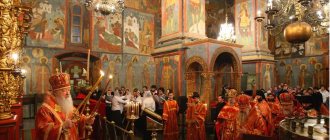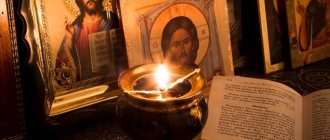A small upper room on Mount Zion is the place where, at a meal with Jesus and his disciples, the words that are now heard daily in the temple were first spoken:
“Take, eat, this is My Body...”
And then - about wine, His “Blood of the New Testament.” This was the first Sacrament of the Eucharist in the history of mankind. It remains the same to this day.
What is the sacrament of the Eucharist?
Communion or communion is one of the elements of the sacred rite, which forms the basis of the Divine Liturgy. The Orthodox Church calls the Eucharist the Lord's Supper, since the roots of this action go back to events associated with the last events of the earthly life of Jesus Christ.
A meal with his closest followers marked the beginning of the sacrament of the Eucharist. At the same time, Christ was taught the commandment of humility, which symbolized the washing of feet. Christ also preached about love without self-interest, which is capable of covering up any unseemly actions; he predicted the betrayal of Judas and the further fate of the Christian Church throughout the world. Maundy Thursday, the time when Holy Week takes place in Christianity, marked the beginning of the rite of communion.
The sacrament includes 2 stages:
- the breaking and eating of bread is designated by Jesus Christ as the acceptance of his body;
- drinking red wine from the offered cup was presented as a symbol of the blood of the Lord.
The establishment of the ritual symbolizes Christ's farewell and the abandonment of his body and blood, as reminders of the suffering he endured. Communion serves as a witness to the believer of the sacrifice made by Christ the Savior; it is the communion of his body and blood, embodied in the sacrament of the Eucharist.
The transformation of bread and wine into flesh and blood by Christ and the further partaking of gifts became the beginning of the introduction of compulsory communion for all believers.
Why do you need to take communion?
Often in church circles you can hear the opinion that if a person prays, keeps the commandments, and tries to live according to his conscience, then this is enough to be considered a good Christian. To be considered may be enough, but to be a real Christian, you need more.
The Eucharist is the tasting of the real Body and real Blood of Christ, only under the guise of bread and wine
You can give the following analogy: a person loves someone. He loves deeply, sincerely, with all his soul. What will all the lover’s thoughts be about? That's right - about how to connect with your loved one, to be with him every moment and every hour. It’s the same with God - if we are Christians, then we love Him with all our souls, and we try to build our lives in such a way as to always be close to Him.
And now the Lord himself gives us a great Miracle - the ability to fit Himself into our sinful bodies. Contain as often as we want. So can we be called believers if we ourselves refuse this meeting, avoid it? Why then is everything else needed if we do not recognize the Living God?
All the holy fathers of our church unanimously spoke about the importance of Communion for the life of an Orthodox person. Even those monks who led a solitary hermit life periodically came out to the brethren to participate in the Eucharist. For them, this doing was a natural need of the soul, like breathing, food or sleep for the body.
Important! We must strive to absorb Communion so deeply that it becomes an integral part of the spiritual life of a Christian.
You need to understand that all the Sacraments of the church are not strict rules introduced by God for our taming. All these are instruments of our salvation that are necessary for man himself. God always stands next to every person and is always ready to enter his soul. But man himself, through his life, does not allow the Lord into himself, drives Him away, does not leave room for Him in his soul. And the path of Orthodox church life with obligatory participation in the Sacraments is a way to open your soul to God so that he can dwell there.
How to get to the Orthodox Church
Many patriarchs and clergy believe that most services are a kind of preparation for participation in communion. This is the most important act in the system of hierarchy of worship, which is the apogee that unites man with God. Gennady Scholarius believed that the rite of the Eucharist should be higher than the sacrament of baptism or confession.
For Orthodox believers, the ceremony takes place taking into account long, step-by-step preparation. According to the clergy, it represents a complete transformation of the body and a shock to the soul. To be ready for communion, you must follow the basic rules:
- conscious attitude towards communion;
- sincere faith in the Lord;
- understanding the meaning of communion;
- possession of basic theoretical knowledge;
- achieving complete peace (forgiveness and reconciliation with others);
- knowledge of thanksgiving prayers and texts (“Following to Holy Communion”).
These rules relate to the internal state of the believer, but there are specific techniques without which the sacrament is impossible:
- Eucharistic or liturgical fast. This is a pre-rite fast, which consists of not eating on the eve of communion, starting at midnight the previous day. The fast lasts taking into account the preparation of the believer, but cannot be less than 6 hours.
- Confession. This is one of the sacraments, which is called the sacrament of repentance. It is held in the evening, on the eve of communion, or in the morning, before the start of the liturgy.
Adults who are confessing for the first time are recommended to undergo repentance, excluding Sundays or holidays. Children under a certain age are not allowed to confess.
How does the Sacrament of Communion take place?
Children under seven years old go to Communion without confession. Adults must confess, telling the priest their sins, sincerely repenting. Confession is performed in churches either in the evening after the evening service, or in the morning before the start of the liturgy.
Confession usually takes place in a church with a large number of people, so you need to respect the secret of confession, not crowd next to the priest, and not worry the confessor who reveals his misdeeds to the priest. A servant of God asks about sins not for his own interest, but acts as a messenger from the Lord.
Liturgy is served in the church in the morning. Find out what time the service starts in a particular church, since everyone’s schedule is different. Liturgy is the main divine service, an amazingly beautiful sacrament that has deep content and meaning. It consists of ancient chants and is aimed at approaching Communion with prayers. The participants pray spiritually at this service and at the end reverently receive communion.
Liturgy takes place before communion
Married couples take Communion before an important step in their lives - accepting a marriage that is made in heaven, before the Wedding. Communion takes place a few days before the official celebration. In the evening before going to bed, they read prayers for communion. And in the morning, without eating food, they go to work. There is only one recommendation before the wedding - be sincere with each other, and God's grace will only bind loving hearts more tightly. Listen sensitively to the prayers read by the priest and pray with him. Only what is said by the priest and sung by the choir is important and necessary for many years of life together.
After Baptism, infants also need to receive communion. The child is obliged to live a spiritual life. If he does not receive communion, his soul may die, and the little man will grow up with a dead soul. Later he may be seized by an evil force, even to the point of mental illness, to the point of madness. And if this does not happen, a person with a not very kind disposition will simply grow up. If a child is given communion according to all the rules, then his soul lives and develops. She falls under the special protection of the Lord's grace. During Lent, infants receive communion only on Saturdays and Sundays.
Hands should be folded crosswise
So, how does the action itself take place? After the queue has lined up:
- fold your arms crosswise on your chest, right on top
- when it’s your turn to approach the priest, say your name and, opening your mouth, take a piece of prosphora with wine from the priest’s spoon
- after the assistants blot your lips with the linen, kiss the cup
- with the same position of your hands, without talking to anyone, go to the table for a drink and, after drinking it, take the prosphora
- After the ceremony it is worth listening to prayers of thanksgiving
Duration of the ritual in the temple
The clergy inform in advance what period of time is most suitable for Holy Communion. Usually it is performed at a ritual service, liturgy, in the first half of the day. Liturgies last from 7 to 11 o'clock, their duration directly depends on the number of people who want to receive communion, as well as on the nature of the service, that is, its dedication.
Those receiving communion must endure the liturgy from the very beginning, and must also attend the evening service on the eve of communion. This stage is considered preparation for the ceremony. Liturgies are held in monasteries and large churches every day.
Reference! For parish churches, the frequency of the liturgy is determined by the priest.
Procedure in Orthodoxy
The Holy Sacrament includes 3 main parts:
- Proskomedia. Symbolizes the bringing of bread and wine. Prosphora is used as bread; it is baked goods made from leavened dough. Red grape wine is diluted with water and poured into a special bowl. Wine is a symbol of the blood of Christ, water is necessary in order to remind Christians of the mixture of blood and water that flowed through the body of the Lord when he was on the cross. The proskomedia is placed on a special sacrificial table, the wine is in a bowl. The bread is represented by five prosphoras, which denotes the number of five loaves mentioned in the Gospel. The priest prays for those who came to the liturgy for communion. On the choir they read: 3 o'clock, Pilate's Court. The last to be read is: “On the nailing of the Lord to the cross.”
- Liturgy of the Catechumens. This part includes earnest prayer for peace. During the Liturgy of the Catechumens, the priest leaves the altar and carries the Gospel in his hands. This exit is called small, it symbolizes the savior’s first exit to preach. During this part, specially composed troparia and kontakia are sung, while Christians remember their loved ones and earnestly pray to the saints for their health. At the end of the prayers, the priest asks to leave the temple, which is a reminder of the unworthiness of receiving communion.
- Liturgy of the Faithful. This part of communion begins with the censing of the priests. This symbolizes the procession of Christ to suffering on the cross. At the same time, the church gates are closed, which is a reminder to protect the soul from vile thoughts. The priests bless the wine and bread that are on the donating table. They bow before him, announcing that it is no longer bread and wine on the table, but the real flesh and blood of Christ. This is one of the most important moments of the ritual. The priests conduct secret prayers, the choir addresses the Mother of God, and believers say the traditional prayer “Our Father.” The priest breaks the bread, and then in the altar behind a closed curtain, the priests receive the flesh, then drink the blood from the chalice. This action is comparable to how the apostles were treated at the Last Supper. After the priests have received communion, the sacrament of consecration of the Eucharist begins for the laity who have come. Each of them approaches the bowl, taking turns.
First Communion of the Apostles
It took place at the Last Supper, when the Lord blessed the bread and wine - according to the Jewish tradition of the Passover meal. But in a different way than the Jews did: He gave them as His Body and Blood. It is no coincidence that the traditional Jewish Passover lamb was not present at that meal - for, according to the word of St. Paul, “Our Passover, Christ, was sacrificed for us” (1 Cor. 5:7)
Last Supper
The same, the first Communion, showed the consequences of unworthy Communion: the unrepentant Judas, who had already decided to betray the Teacher, not only did not receive the gifts of grace, but, according to the Apostle, “Satan entered into him.” He not only betrayed Christ. Even after repenting, he gave in to despair, reaching the point of suicide. And now, as the fathers say, similar things happen - even before illness, death, with unworthy people who approach without reverence or repentance.
What to do during the sacrament
During communion, believers fold their arms crosswise on their chests, and then, when approaching the cup, they say their name and kiss the edge of the cup. This kiss symbolizes worship of the Lord's body by touching the rib pierced by a spear.
When receiving communion, they observe the order, calmly waiting for their turn, letting children and old people pass first. The action takes place calmly, without unnecessary conversations or movements.
The clergy remind: Christ was the author of the saying that “the first will be last, and the last will be first.”
How to prepare properly
Special attention is paid to preparation for communion. This period is important for every believer, as the basis on which the whole essence of the sacred ritual rests. Preparation for communion may depend on the age and other characteristics of the believer.
Prayer Rule
Home prayer occupies an important place in preparation for the ceremony. The day before, they read the “Succession,” which is called part of the sacred rite. At a divine service, it is customary to read 3 canons in succession:
- addressed to the Mother of God;
- repentant to Christ the Savior;
- repentant to the Guardian Angel.
Fast
The conduct of fasting depends on the believer:
- Those who regularly observe fasts are recommended to perform only liturgical short fasts.
- Those who begin to join the church and have not observed fasts are advised to undergo a three-day or seven-day fast. The duration of fasting depends on the recommendations of the priest, with whom these nuances are discussed on the eve of planning communion.
Confession
Confession and absolution are discussed with the priest in advance. The time for confession is chosen so that it is enough for a detailed action of self-awareness. Sometimes the priest may ask for confession again and postpone the sacrament until the next time.
How to confess in church correctly
Many are also concerned about the question of how to properly confess in church - embarrassment and inexperience get in the way. But in order to prove to God your firm desire to improve, you will have to overcome your fears. The priest is only a witness, he has seen and heard a lot, so it is unlikely that he will be greatly surprised. But before you approach your confessor, you need to prepare.
Since many people feel nervous during confession, there is a tradition of writing down their sins on a piece of paper. At the end of confession, the priest takes this “list” and tears it up, as a sign that the Lord forgives everything. To compose a confession, you can use a special brochure, or simply take the 10 commandments and think about how you sinned against each.
- During confession, you should not blame others, thereby justifying your negative behavior. Example: a wife yelled at her husband and said that it was “himself to blame” because he came drunk. Let it be so, but in any situation you must restrain yourself, act with love, without insults. Just like confessing in church, it is necessary to talk only about yourself, and not about others.
- There is also no need to boast that there are no sins against some commandments. And is this so? Adultery is considered not only physical betrayal, but even thoughts about it. Smoking is a slow form of suicide, and this is the gravest sin. In addition, the smoker harms those around him, aggravating his guilt. It is necessary to repent of this sin, because a Christian must maintain order not only in the soul, but also monitor the health of the body.
- There is no need to argue with the priest. This is a serious sin, for which one can be excommunicated from communion altogether. Most likely, there are things that are still unclear to you. You should reflect on what has been said.
Become a courier of the Yandex.Food service right now (up to 3,400 rubles per shift) leave a request →
There are no strict rules governing what to say in church during confession. It is important to show a sincere desire to improve. Confessors usually help those who are experiencing difficulties by asking questions. There is no need to list every sin whose name is found in the books. Many have a common root - pride, greed, unwillingness to work on oneself, dislike for neighbors.
Features of Communion
The performance of the sacrament may be complicated by the state of health or age of the believer. There are separate rules that apply to rituals for children and people diagnosed with serious illnesses.
Children
Infants receive communion at the same time as baptism. Children under 7 years of age are allowed not to confess, fast, or read prayers before communion.
sick
For seriously ill people, certain rules are established:
- Those who are unable to prepare for communion and confess, receive communion without preparation. At the same time, the priest turns to the Lord, asks for faith and at the same time absolves the sins of the patient.
- Those who are excommunicated from divine services, but are on the verge of death, or their lives are in serious danger, receive communion at a time specially discussed with the priest.
Ritual for children and the sick
Figure 4. The priest gives communion to the sick
It is recommended that baptized children be brought to communion more often; fortunately, until the age of seven, children do not have to fast or go to confession. The only thing the canon requires of them is to read a few familiar prayers and not eat anything since midnight. The same rules apply for teenagers as for adults.
It is similar with the sick - if a person is on the verge of death, no one demands that he fast. He does not have to go to a cathedral or temple - the priest himself can come to his bedside, confess and give him communion.
On Christmastide, Communion is carried out according to the usual procedure. The week after Easter is special - you don’t have to fast during it.
What to do after communion
After the ceremony, prayers of thanksgiving are heard at the cup. At the same time, they thank the Lord for his gifts.
If for some reason prayers of thanks are not said in church, they must be read at home. Throughout the day, it is advised to be detached from the bustle of everyday life or idle talk, and it is recommended to read spiritual literature. These techniques help to preserve the Grace received for a long time.
Rules of behavior in the temple
There are several traditional rules about how to behave in a worship service. They are necessary for those who are just joining church life, or for those who want to teach children:
- Beginners who have embarked on the path of churching are allowed to use the prayer book.
- To go to the temple, they choose special clothes: they do not wear trousers, short skirts, or expose parts of the body. Women must have a headscarf or scarf; men must remove their hats.
- When entering, they must bow, having crossed themselves first.
- When leaving the temple, bows are repeated.
- To perform prayers, it is advised to close your eyes, focus on your inner world, not look around, and think about your affairs.
- The time spent at the liturgy, according to church canons, means making a sacrifice to God, therefore the entire service is stood from the very beginning to the end. Only elderly or sick people are allowed to sit.
Communion practice: preparation, frequency, features
The greatest number of questions among believers is raised by the practical side of participation in the fullness of church life. Since Orthodoxy is not a formal faith of prohibitions, there are a large number of different opinions and approaches to Communion.
The most important sacrament of the Orthodox Church is communion
Some priests may also give various recommendations in this regard, based on their pastoral experience and the benefit for a particular person. Don't be embarrassed by so many different opinions. In essence, they boil down to one goal - for a person to worthily let the Lord into his life.
As for the official position of the Church on the participation of believers in the Eucharist, there is a special document that clarifies all the main points. It is called “On the Participation of the Faithful in the Eucharist” and was signed by representatives of the Bishops’ Conference of the Russian Orthodox Church in 2015.
According to this document, the frequency, rules of preparation and other requirements for believers before and after receiving the Mysteries of Christ are determined by spiritual mentors based on the characteristics of a particular person’s life. Let us consider below the features of communion for modern Christians.
How to properly prepare for the Sacrament?
Communion is a very important and responsible moment in spiritual life, and therefore requires special preparation. Just as we prepare for some special days in worldly life, so we must set aside time to prepare for a meeting with God.
Read about preparing for Communion:
- Is it possible to celebrate Communion without Confession?
- Is it possible to brush your teeth before Communion?
- How to fast before Communion
According to the rules of our Church, before Communion all believers are required to fast and have a special prayer rule. Fasting is needed in order to pacify our flesh a little, quench its passions and subordinate it to spiritual needs. Prayer calls us to dialogue with the Lord, to communicate with Him.
Before Communion, all believers are required to have a special prayer rule
If you take an Orthodox prayer book, you can see that before receiving the Holy Mysteries of Christ, believers need to read a special rule. It includes the Follow-up to Holy Communion, as well as several canons and akathists. These prayers are usually read in addition to the basic morning and evening prayer rules.
A new Christian who has decided to participate in the Eucharist for the first time in his life may find it very difficult to read such a large volume of prayer texts. In addition, such backbreaking work will lead to despondency, great fatigue and a lack of understanding of the meaning.
Important! Any prayers, including those preparatory to Communion, must be read carefully, heartily, letting every word pass through your soul. Mechanical proofreading in pursuit of greater volume is completely unacceptable.
Therefore, a person who has decided to take communion for the first time needs to consult with an experienced priest about the feasible volume of prayers. It is much better to read a small rule, but with attention, than to read everything, but without completely understanding what is being said.
Read about other prayer rules:
- Prayer rule of Seraphim of Sarov for the laity
- Prayer rule against night and day desecration
- How to pray correctly for Orthodox Christians
About the post
Fasting is abstaining from eating animal products, as well as limiting idleness, entertainment and fun. You don’t need to think that fasting is a sad state of banning all joys in life. On the contrary, fasting helps a person to cleanse his soul so that it can contain the real Joy of God.
The measure of fasting before the Eucharist is as individual as the prayer rule. If a person has not previously had experience of restriction, then it makes no sense to impose a week-long fast on him before Communion. This will only lead to the person losing his temper, giving up everything and completely changing his mind about going to church.
Important! It is a generally accepted practice for believers to fast for three days before Communion. In addition, you need to go to church on an empty stomach and not eat or drink anything else until you partake of the Body and Blood of Christ.
The number of days of fasting may vary depending on the frequency of communion. If a person rarely begins the Sacrament, for example, several times a year, or once during Lent, then, of course, fasting can be longer (from several days to a week). If a person leads a rich spiritual life and tries to take communion every Sunday or every trip to church, he simply will not be able to fast for that long.
Before Communion, believers fast
For Orthodox Christians who very often participate in the Eucharist, it is permissible to shorten the fast to one day the day before. In any case, it is advisable to resolve such issues not on your own, but on the advice of an experienced priest. On the one hand, it is important not to take on impossible feats, and on the other hand, not to be lazy. An attentive confessor will be able to determine the correct line.
Confession
Despite the fact that confession is a separate Sacrament, it is inextricably linked with the Eucharist. The Orthodox tradition has always been based on the obligation of confession before receiving the Holy Mysteries of Christ.
Confession before communion is quite logical, because even while waiting for guests to come to our home, we put things in order and remove the dirt. How can we let the Lord into us without first cleansing our soul with repentance?
Important! Many holy fathers warn that if a person does not feel the inner need for frequent confession, then he is in a state of spiritual sleep.
Confession, when accompanied by sincere repentance, cleanses the soul and removes the burden of heavy sins. A person gets rid of everything unnecessary and can let the Lord into himself. Confession is necessary every time a person approaches the Eucharist, regardless of its frequency.










